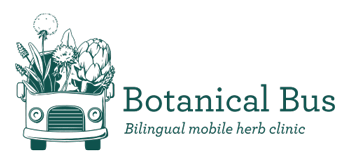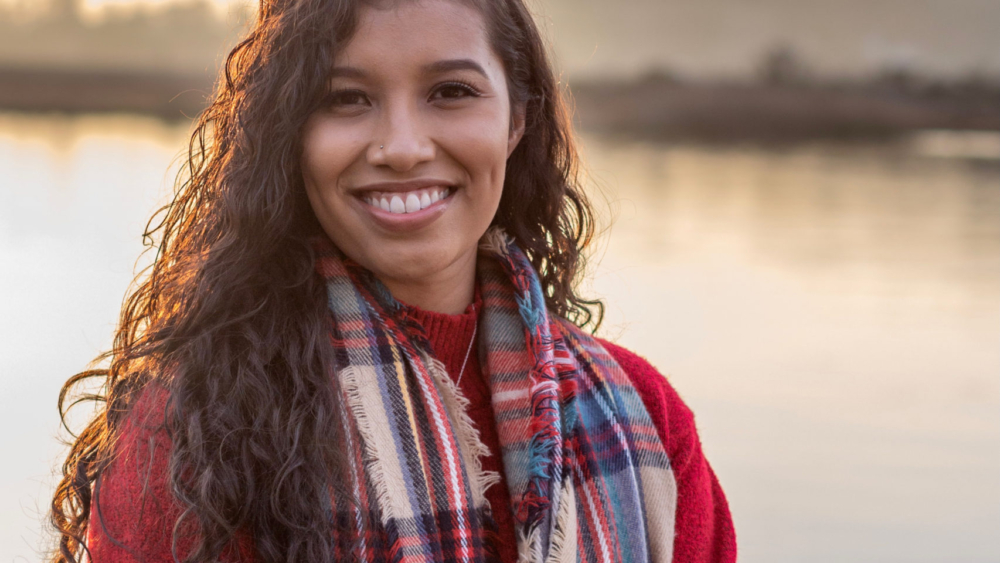by Katherine Tuider
Over warm bowls of Chupe de Pescado (Peruvian fish stew), I sat down with our newest team member and The Botanical Bus’s Clinic Coordinator, Yatziry Galvan, to learn more about what inspired her to serve her community and embark on a new journey of herbalism.
At the sound of rain, Yatziry is transported back to family dinners on the beach in Oaxaca. After a long day of work, her grandparents would take little Yatziry to watch the sun set into the Pacific, rain or shine. Yatziry’s large brown eyes smile as she recalls this memory, one that is filled with such warmth, love and security.
Yatziry lived in a small village near Puerto Escondido, Oaxaca, Mexico. Her parents entrusted her to the care of her grandparents so that they could seek out economic opportunities for their family in Napa, California. Each day,Yatziry would help her grandmother at their barbacoa stand, marinating the chivo (goat) meat her grandfather had butchered, and then steaming it all day long. The vapor from the pot would radiate out through holes of the clay top, warming tortillas for the next customer. Yatziry remembers the mouthwatering combination of juicy chivo, soft tortillas, salsa verde and a squeeze of lime. Though they did not have a lot of money, this was a very happy time in Yatziry’s life.
Starting a New Life
When Yatziry was seven years old, her parents brought her to the US to live with them in Napa, California. They were able to place her in a bilingual school, easing her transition, but certainly not eradicating the tremendous culture shock she experienced. The following year, she changed schools. Being one of the only Latine kids at the school, she felt isolated not only culturally, but also linguistically because she did not speak English. Napa then and now, is a town of tremendous economic disparity between the vineyard owners and the farmworkers who tend their vines, and Yatziry’s elementary school was no exception to this socioeconomic chasm. Though both of her parents worked all of the time, they were paid very low wages, and so money was tight. Yatziry remembers having very few clothes, and the ones she did have were ill-fitting.
This feeling of being an outsider in a foreign land continued on until her freshman year of high school when Yatziry slowly began to feel at home in Napa. Yatziry attests that a key person in this transition was her best friend, Marisol. Though Marisol had moved away from Napa when they were in elementary school, Yatziry was thrilled to see Marisol reappear in her freshman art class. Marisol helped Yatziry navigate the challenges of being bicultural, bilingual and low-income in a town that was monocultural, monolingual and expensive. As Yatziry’s confidence and sense of belonging began to build, one thing became very clear to her—if she wanted to break free from the harsh economic realities that her hardworking family faced, she needed to go to college.
The DREAMER
A dedicated student, Yatziry was excited to begin the process of applying for college her senior year of high school. She was devastated to find out from her college counselor and teachers that her dream of going to a four-year institution was not possible because she was undocumented. Despite door after door closing on her goal of going to college, she remained resolute to pursue higher education. She then found a new scholarship called TheDream.US inspired by the DREAM Act that would cover the costs of attending college. Yatziry shared that she was the first student to receive this scholarship at Sonoma State University, which inspired her to work at the school’s Dream Center, and as a student ambassador where she helped other undocumented students navigate higher education and helped inform high school students how to apply for and finance higher education.
Yatziry completed her first two years at Napa Valley College and then was able to transfer to Sonoma State, where she graduated with a B.S. in Business Administration with Cum Laude Honors. During her time at Sonoma State, Yatziry was awarded both a national and state fellowship. She continued her work empowering other undocumented students to seek educational opportunities, as well as her younger siblings and cousins. Yatziry smiled as she admitted that she made all of her younger family members take the AVID (Advancement Via Individual Determination) course in high school, which helps prepare students for college and their careers. Reflecting on her youth, Yatziry shared,
“The struggles that my family and I faced, both economically and because of the language barrier really motivated me to help others in my community that might be facing some of the same challenges. My hope is to be that helping hand that I needed growing up.”
Yatziry’s Herbalism Journey
When asked about what lead her towards herbalism, Yatziry shared that she recently embarked on this journey this year when she decided to prioritize her mental health. She realized that after a lifetime of trauma, struggle and challenging familial dynamics, it was time to prioritize her own wellbeing, and so she booked her first trip to Maui. There she participated in a profoundly healing retreat based around meditation in nature that shifted her attention towards herbalism. Slowly, memories of herbal remedies that her grandmother utilized when she was a child began to come back. Yatziry shared,
“I think that herbal medicine has come into my life to reconnect with myself, with my roots, my ancestors, madre tierra (mother earth) and to my community as well. Being a part of The Botanical Bus has brought me deep healing and it is so incredibly rewarding to be able to help create a bilingual, bicultural space where our community can come together to nurture each other.”
Recalling her birth story, Yatziry said that she owes her life to herbalism. Her mother had gone into labor when she was only seven months pregnant, and they lived over three hours away from the nearest hospital. While experiencing contractions, her mother hobbled onto the bus for the long ride to Jamiltepec, Oaxaca. When she arrived, all of the beds were full, and so she had to wait on the floor until a bed opened up for her delivery. Yatziry was moved to an incubator, but there was nowhere for her mother to stay so she continued to sleep on the floor after having just given birth. Eventually, her mother needed to return home to heal herself as well, so they took Yatziry home, tiny and weak. Yatziry’s grandmother told her that they used herbal remedios y recetas (remedies and recipes) to nurse Yatziry to health. Yatziry never learned the exact contents of those herbal remedies, and so her new goal is to spend more time with her grandmother, and write down her remedios y recetas. Thankfully, Yatziry’s grandmother was able to move to the US a few years ago, and so Yatziry tries to see her every week.
As The Botanical Bus’s Clinic Coordinator, Yatziry works directly with our Promotoras (Community Health Advocates) to facilitate Farmworkers Clinics and Wellness Workshops, as well as participate in our Promotora Training Program. She has been able to develop friendships with the Promotoras, who have been seminal in her herbalism education. At a recent Wellness Workshop Yatziry co-facilitated with Promotora, Lulu Pérez, she found herself drawn to Salvia (Sage). As Lulu and her discussed the healing properties of this plant, a hummingbird buzzed by, dipping its perfectly designed beak into the Sage flower and relishing in its sweet nectar. Yatziry paused mid-sentence to marvel at not only the beauty of this Joya voladora (hummingbird or translated literally “flying jewel”), but the significance of seeing this tiny creature with an enormous heart at this particular moment: her grandmother adores hummingbirds.
As Yatziry deepens her knowledge of herbalism, she realizes that the knowledge is already within her through her matrilineal line. For her, herbalism is a re-learning and healing of memories.

